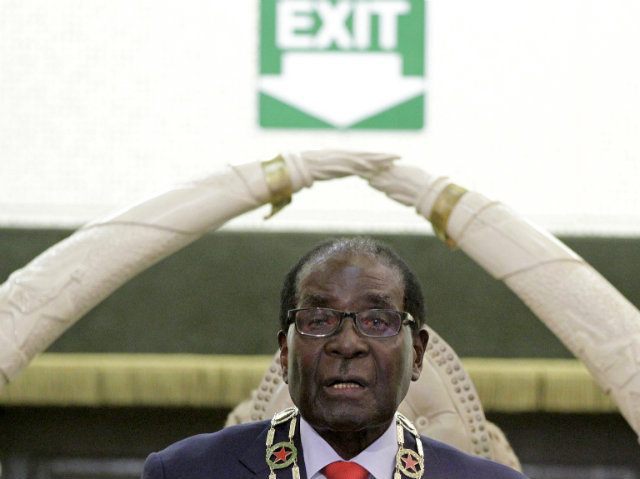Zimbabwe president Robert Mugabe has joined Fidel Castro, Kofi Annan, and Vladimir Putin as a Confucius Peace Prize laureate, the Chinese competitor to the Nobel Peace Prize.
The brutal Marxist dictator, who turned one of the richest countries in the world into one of the poorest with a combination of misguided ethnic nationalism and land reform, has been rewarded for his efforts with the award and contingent cash prize and golden trophy. Awarded for contributions to world peace as viewed from an Eastern perspective, the chairman of the awarding committee congratulated Mugabe on “injecting fresh energy” into world harmony.
The Confucius Peace Prize said in a statement: “Ever since Robert Mugabe was sworn in as the president of Zimbabwe in the 1980s, he has worked hard to bring political and economic order to the country and to improve the welfare of the Zimbabwean people by overcoming hardship”.
This will come as a surprise to many who live in Zimbabwe, and others who have long since been forced out of the country by Mugabe’s policies on land and business ownership and persecution of the national white community over the past 35 years. Although president Mugabe occasionally submits himself for election, as happened in 2013, the votes take place against a backdrop of intimidation by the ruling Zanu-PF party and the military, who made it clear only one result would be accepted.
A key part of the charade of democracy in Zimbabwe is the existence of opposition parties. The Zimbabwe People’s Democratic Party has no members of parliament, but campaigns consistently for the establishment of a true democracy in the country. Secretary general of the party Gorden Moyo was “utterly disgusted” with the award, reports The Guardian, who described Mugabe’s reign as “paved with blood, violence, arson and cruelty”. He said of Mugabe himself ““a war-monger … and a sadist who delights in the misery of the people”.
Until 1980 Zimbabwe was known as Rhodesia, and despite human rights concerns over the white-minority government held by the international community the nation was comparatively stable, wealthy, and productive. Drastic measures introduced by Mugabe after his 1980 coup intended to take away businesses and farms owned by white citizens of the nation and transfer them to the ownership of the black majority saw them instead given to a new elite of Mugabe’s close friends and advisers.
With the former white owners who had built and developed Rhodesian agriculture and industry over the preceding century expelled, national output began to fell as the new owners lacked the technical knowledge or interest to run the businesses properly. The situation further deteriorated as thousands of civilians were massacred in racist purges as Mugabe moved to solidify his position as leader.
New papers released this year showed conclusively for the first time that Mugabe as Prime Minister personally orchestrated the mass killings of Ndebele people in Matabeleland, who had formed the main political opposition to Mugabe in the early years of Zimbabwe.
Despite being more brutal and less effective than the white government that went before it, Mugabe has faced remarkably little opposition from the international community, and the revelation of his key role in the Matabeleland massacres hasn’t harmed his global standing. Breitbart London reported in January on his taking the leadership of the African Union, the pan-continent alliance of 54 nations and over one billion people.
Considering his own record at home, Mugabe’s pledge to make his chairmanship about focussing on Africa’s “issues of infrastructure, value addition and benefication, agriculture and climate change in the context of Africa’s development” may have struck an ironic, if not menacing note for some. Piers Pigou, the Southern Africa director of the International Crisis Group said of the selection: “His elevation sends a negative signal of African solidarity with leaders who’ve misruled their countries”.
Follow Oliver Lane on Twitter: Follow @Oliver_Lane or e-mail to: olane@breitbart.com

COMMENTS
Please let us know if you're having issues with commenting.